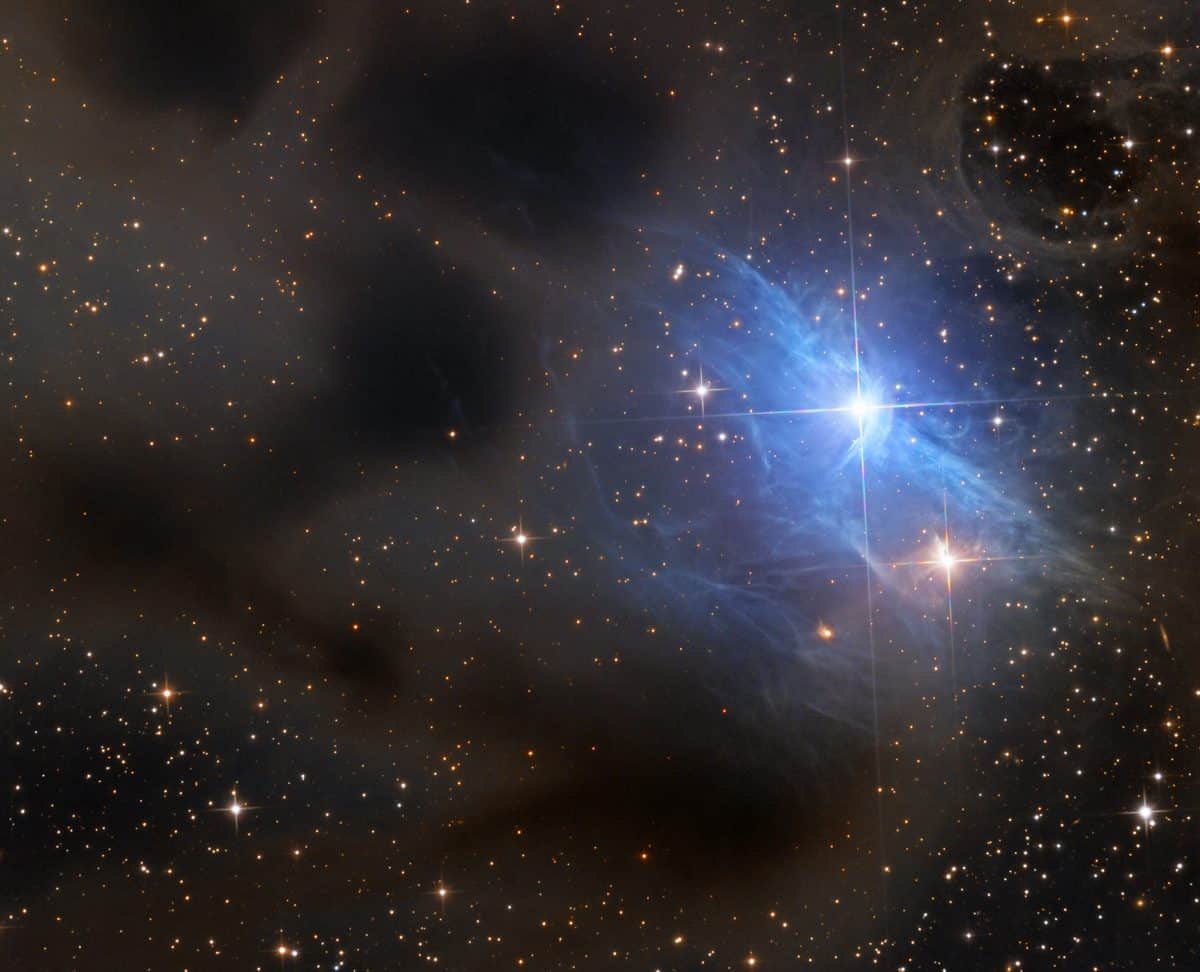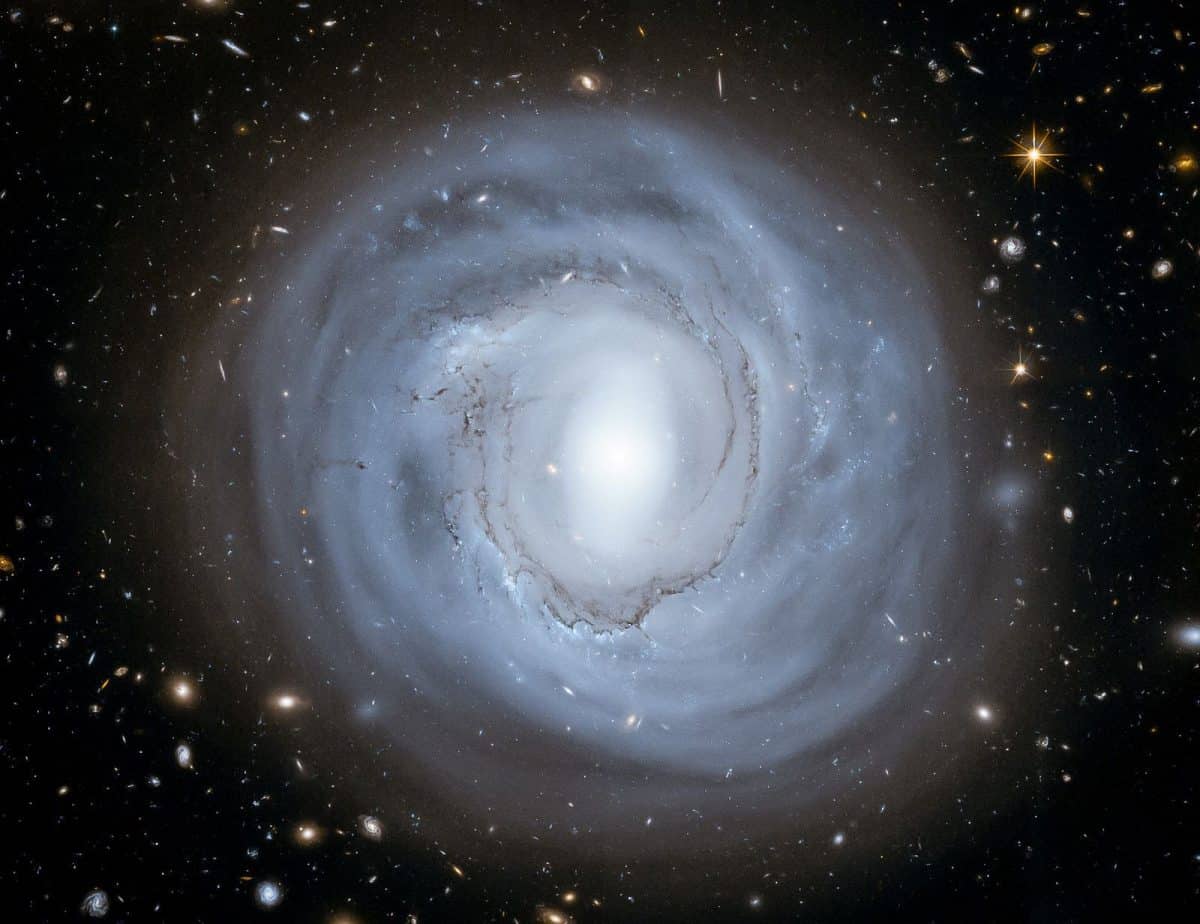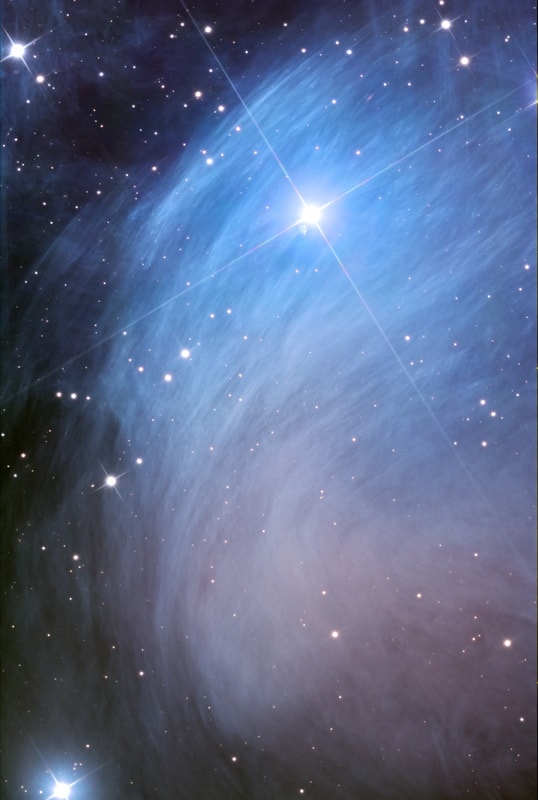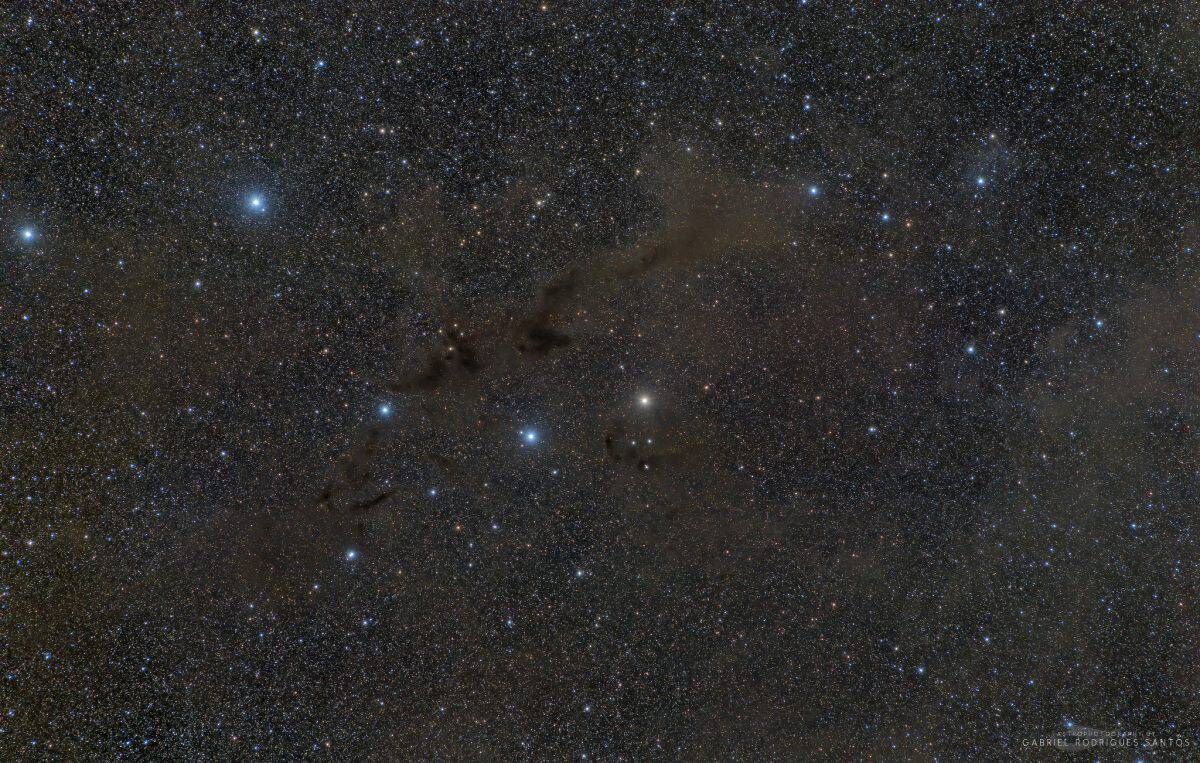Blog
Riding high in the constellation of Auriga, beautiful, blue vdB 31 is the 31st object in Sidney van den Bergh’s 1966 catalog of reflection nebulae. It shares this well-composed celestial still life with dark, obscuring clouds recorded in Edward E. Barnard’s 1919 catalog of dark markings in the sky. All are interstellar dust clouds, blocking the light from background stars in the case of Barnard’s dark nebulae. For vdB 31, the dust preferentially reflects the bluish starlight from embedded, hot, variable star AB Aurigae. Exploring the environs of AB Aurigae with the Hubble Space Telescope has revealed the several million year young star is itself surrounded by flattened dusty disk with evidence for the ongoing formation of a planetary system. AB Aurigae is about 470 light-years away. At that distance this cosmic canvas would span about four light-years.
more...Cass Elliot (born Ellen Naomi Cohen; September 19, 1941 – July 29, 1974), also known as Mama Cass, was an American singer and actress, best known as a member of the Mamas & the Papas. After the group broke up, she released five solo albums. In 1998 she was posthumously inducted into the Rock and Roll Hall of Fame for her work with the Mamas & the Papas.
Ellen Naomi Cohen was born in Baltimore, Maryland, the daughter of Philip Cohen (d: 1962) and his wife Bess (née Levine, 1915–1994).
more...Donald Matthew Redman (July 29, 1900 – November 30, 1964) was an American jazz musician, arranger, bandleader, and composer.
Redman was born in Piedmont, Mineral County, West Virginia. His father was a music teacher, his mother was a singer. Don began playing the trumpet at the age of three, joined his first band at the age of six and by the age of 12 was proficient on all wind instruments ranging from trumpet to oboe as well as piano. He studied at Storer College in Harper’s Ferry and at the Boston Conservatory, then joined Billy Page’s Broadway Syncopaters in New York City. (He was the uncle of saxophonist Dewey Redman, and thus great-uncle of saxophonist Joshua Redman and trumpeter Carlos Redman.
https://www.youtube.com/watch?v=Iinepb4AbwU
more...Charles Henry Christian (July 29, 1916 – March 2, 1942) was an American swing and jazz guitarist.
Christian was an important early performer on the electric guitar and a key figure in the development of bebop and cool jazz. He gained national exposure as a member of the Benny Goodman Sextet and Orchestra from August 1939 to June 1941. His single-string technique, combined with amplification, helped bring the guitar out of the rhythm section and into the forefront as a solo instrument. John Hammond and George T. Simoncalled Christian the best improvisational talent of the swing era. In the liner notes to the album Solo Flight: The Genius of Charlie Christian (Columbia, 1972), Gene Lees wrote that “Many critics and musicians consider that Christian was one of the founding fathers of bebop, or if not that, at least a precursor to it.”
Christian’s influence reached beyond jazz and swing. In 1990, he was inducted into the Rock and Roll Hall of Fame in the category Early Influence.
In 2006 Oklahoma City renamed a street in its Bricktown entertainment district “Charlie Christian Avenue” (Christian was raised in Oklahoma City and was one of many musicians who jammed along the city’s “Deep Deuce” section on N.E. Second Street).
Christian was born in Bonham, Texas. His family moved to Oklahoma City, Oklahoma, when he was a small child. His parents were musicians.
In 1939, Christian auditioned for John Hammond, who recommended him to the bandleader Benny Goodman. Goodman was the fourth white bandleader to feature black musicians in his live band: the first was Jimmy Durante, for whom the clarinetist Achille Baquet played and recorded in Durante’s Original New Orleans Jazz Band (1918–1920); the second was the violinist Arthur Hand, who led The California Ramblers, which, from 1922 to 1925, included the trumpeter Bill Moore, who was billed as the Hot Hawaiian; the third was Ben Bernie, whose band from 1925 to 1928 also featured Moore. Goodman became the fourth by bringing in Teddy Wilson on piano in 1935 and Lionel Hampton on vibraphone in 1936. Goodman hired Christian to play with the newly formed Goodman Sextet in September 1939.
more...Ulla Pirttijärvi is a Sami joik singer from the village of Angeli (Sami: Aŋŋel), Finland. She began her career with the music group Angelin Tytöt, but left soon after to pursue a solo career. She performs traditional joik music with Western arrangements of contemporary instruments.
Ulla Pirttijärvi was raised with joik music and chanting. As a young child, Ulla listened to her mother and uncle sing stories to her, and she chanted along; by age ten she was singing on her own. She then started performing in public with a group of young girls who called themselves Angelin Tytöt.
more...NGC 4921 is a barred spiral galaxy in the Coma Cluster, located in the constellation Coma Berenices. It is about 320 million light-years from Earth. The galaxy has a nucleus with a bar structure that is surrounded by a distinct ring of dust that contains recently formed, hot blue stars. The outer part consists of unusually smooth, poorly distinguished spiral arms.
In 1976, Canadian astronomer Sidney Van den Bergh categorized this galaxy as “anemic” because of the low rate at which stars are being formed. He noted that it has “an unusually low surface brightness and exhibits remarkably diffuse spiral arms“. Nonetheless, it is the brightest spiral galaxy in the Coma Cluster. This galaxy is located near the center of the cluster and has a high relative velocity (7,560 km/s) compared to the mean cluster velocity. When examined at the 21 cm wavelength Hydrogen line, NGC 4921 was found to be strongly H I deficient, indicating it is low in hydrogen. The distribution of hydrogen has also been deeply perturbed toward the SE spiral arm and is less extended than the optical disk of the galaxy. This may have been caused by interaction with the intergalactic medium, which is stripping off the gas.
On May 4, 1959, a supernova explosion was observed in this galaxy by M. L. Humason using a Schmidt telescope at the Palomar Observatory. It appeared “quite far from the center” of the galaxy, and reached an estimated peak magnitude of 18.5. The light curve proved similar to supernova SN 1987a in the Large Magellanic Cloud, and it displayed “unusual photometricbehavior”
more...Michael Bernard Bloomfield (July 28, 1943 – February 15, 1981) was an American guitarist and composer, born in Chicago, Illinois, who became one of the first popular music superstars of the 1960s to earn his reputation almost entirely on his instrumental prowess, since he rarely sang before 1969. Respected for his guitar playing, Bloomfield knew and played with many of Chicago’s blues legends before achieving his own fame and was instrumental in popularizing blues music in the mid-1960s. He was ranked No. 22 on Rolling Stone‘s list of “100 Greatest Guitarists of All Time” in 2003 and No. 42 by the same magazine in 2011. He was inducted into the Blues Hall of Fame in 2012 and, as a member of the Paul Butterfield Blues Band, was inducted into the Rock and Roll Hall of Fame in 2015.
more...Charles Reed “Charlie” Biddle, CM (July 28, 1926 – February 4, 2003) was a Canadian jazz bassist.
In West Philadelphia, born and raised, Biddle lived most of his life in Montreal. However, he did not become a Canadian citizen until his last years. After completing military duties in the US Armed Forces during World War II, serving in China, India and Burma, he went on to study music at Temple University in Philadelphia, where he started playing bass. In 1948, he arrived in Montreal while touring with Vernon Isaac’s Three Jacks and a Jill. Biddle was fascinated by the fact that in Canada, particularly Quebec, you would see black jazz musicians playing alongside white jazz musicians as the best of friends. Impressed with the opened-mindedness of the people of Canada in matters of race, he decided to settle down in Montreal, and fell in love with a French-Canadian woman, Constance. The two eventually married and raised three daughters – Sonya, Stephanie and Tracy – and a son, Charles Biddle Jr.
Biddle was employed as a car salesman from 1954 to 1972, while performing with pianists Charlie Ramsey, Milt Sealey, Alfie Wade, Sadik Hakim, and Stan Patrick in local Montreal nightclubs. As a promoter, he booked musicians Johnny Hodges, John Coltrane, Pepper Adams, Bill Evans, Art Farmer, Tommy Flanagan and Thad Jones to perform in Montreal. He performed off and on with guitarist Nelson Symonds between 1959 and 1978. Between 1961 and 1963 they performed together under Biddle’s leadership at Dunn’s, La Tête de l’Art, etc.; and under Symonds’ leadership at the Black Bottom from 1964 to 1968. As a duo they performed at several resort communities in the Laurentians between 1974 and 1978.
more...Featuring Mustapha Baqbou, Said Oughassal, Brahim El Belkani, Abdelqader Oughassal & Said Fafy
more...
Merope, designated 23 Tauri (abbreviated 23 Tau), is a star in the constellation of Taurus and a member of the Pleiades star cluster. It is approximately 380 light years away.
Merope is a blue-white B-type subgiant with a mean apparent magnitude of +4.14. Richard Hinckley Allendescribed the star as lucid white and violet. It has a luminosity of 630 times that of the Sun and a surface temperature of 14,000 kelvins. Merope’s mass is roughly 4.5 solar masses and has a radius more than 4 times as great as the Sun’s. It is classified as a Beta Cephei type variable star and its brightness varies by 0.01 magnitudes.
Surrounding Merope is the Merope Nebula (NGC 1435). It appears brightest around Merope and is listed in the Index Catalogue as number IC 349.
more...Jean Toussaint (born July 27, 1960) is an American jazz tenor and soprano saxophonist.
Toussaint was born in Saint Thomas, U.S. Virgin Islands, and was raised in Saint Thomas and New York City. He learned to play calypso as a child and attended Berklee College of Music in the late 1970s, studying under saxophonist Billy Pierce. In 1979 he formed a group with Wallace Roney and from 1982 to 1986 was a member of Art Blakey and the Jazz Messengers alongside Terence Blanchard, Donald Harrison, Mulgrew Miller and Lonnie Plaxico. With Blakey he recorded three studio albums, including New York Scene, which won a Grammy for Best Jazz Instrumental Performance.
more...July 27-1956 Los Angeles
Dale Fielder is an American jazz saxophonist, composer and band leader. He is a multi-instrumentalist who plays all four saxophones: soprano, alto, tenor and baritone with equal authority. He is known for his original compositions and choice of performing rare, obscure jazz classics as well as his varied group concepts and variety of presentations. Fielder has recorded over 14 CDs as a leader for various labels since he first appeared on the national jazz scene in 1993 with his first CD Free Flow.
Dale Fielder grew up in Midland, Pennsylvania, a suburb of Pittsburgh where he studied oboe, bassoon and tuba in the school system and clarinet, saxophone, composition and arranging privately with noted Pittsburgh area tenor saxophonist Phillip Celli. During his high school years, he also performed in the local territory R&B band, The Ohio Supremes, based out of Stuebenville OH, that was affiliated with the Stax Recording Company. Fielder is also a product of the University of Pittsburgh Jazz Studies Program, where he studied as an ethnomusicology major under Dr. Nathan Davis. Fielder’s debut jazz performance was as a member of the Joe Harris Quartet, former drummer of the Charlie Parker Quintet and Dizzy Gillespie Orchestra. After relocating to NYC, he was a recipient of a National Endowment for the Arts grant in 1984, studying with trumpeter/composer Frank Gordon and completed his first large work, The Aquarian for alto saxophone and chamber orchestra. While in NYC, he also performed with a host of current jazz stars such as pianist/composer Geri Allen and trombonist Robin Eubanks among many others.
After eight years in NYC, Fielder moved to Los Angeles and studied with alto legend, Charles McPherson. He then embarked on the challenging path of becoming a band leader, establishing the Dale Fielder Quartet, the DFQ, with pianist Harold Land, Jr. in 1988. After bursting on the national jazz scene with two top-twenty CDs: Free Flow (1993) and Know Thyself (1995), in 1996, Fielder recorded a very successful national top-ten CD, Dear Sir: Tribute To Wayne Shorter to widespread critical acclaim. In 1997, Fielder received his first commission and wrote the extended eleven-movement jazz suite, Ocean Of Love And Mercy, which was recorded in performance by an all-star Nonet and released by Cadence Jazz Records. He has since performed throughout Europe and Asia with his Quartet. Selected as BET’s 1999 Jazz Discovery winner, Fielder has taped several subsequent video appearances and shows for BET.
more...World Music on Flamenco Fridays with Sabicas.
Sabicas (proper name: Agustín Castellón Campos) (16 March 1912 – 14 April 1990) was a flamenco guitarist of Romani origin.
Sabicas was born in Pamplona, Spain, and began playing guitar at the age of five and made his performing debut two years later. His early style was influenced by Ramón Montoya, to whom he was related on his mother’s side of the family. Extensive collaboration with important cantaores (male flamenco singers) of the period helped him develop his personal style.
Leaving Spain in 1936 during the Spanish Civil War, he went into exile in South America with bailaora (dancer) Carmen Amaya. He lived in Mexico City, married Esperanza González Erazo and had four children: Maricruz 1944, Carlos 1946, Agustine 1952 and Margaret 1956. Agustine and Margaret live in New York City, Maricruz lives in Alaska, and Carlos is deceased. Amaya and Sabicas toured together several times. Sabicas later settled in New York City in the United States where he formed a life-long friendship and business association with classical guitarist Rolando Valdés-Blain. He did not return to his native Spain until 1967.
more...These dark markings on the sky can just be found in silhouette against a rich, luminous background of stars. Seen toward the southern constellation of Lupus the Wolf, the dusty, obscuring clouds are part of the Lupus Molecular Cloud some 500 light-years distant. Packs of low mass stars are forming within them, from collapsing cores only visible at long infrared wavelengths. Still, colorful stars in Lupus add to this pretty galactic skyscape. It spans about 8 degrees, not far from the central Milky Way.
more...
Sir Michael Philip Jagger (born 26 July 1943), known professionally as Mick Jagger, is an English singer-songwriter, musician, composer and actor who gained fame as the lead singer and one of the founder members of the Rolling Stones. Jagger’s career has spanned over five decades, and he has been described as “one of the most popular and influential frontmen in the history of rock & roll”.[3] His distinctive voice and performances, along with Keith Richards‘ guitar style have been the trademark of the Rolling Stones throughout the band’s career. Jagger gained press notoriety for his admitted drug use and romantic involvements, and was often portrayed as a countercultural figure.
Jagger was born and grew up in Dartford, Kent. He studied at the London School of Economics before abandoning his academic career to join the Rolling Stones. Jagger has written most of the Rolling Stones’ songs together with Richards, and they continue to collaborate musically. In the late 1960s, Jagger began acting in films (starting with Performance and Ned Kelly), to a mixed reception. He began a solo career in 1985, releasing his first album, She’s the Boss, and joined the electric supergroup SuperHeavy in 2009. Relationships with the Stones’ members, particularly Richards, deteriorated during the 1980s, but Jagger has always found more success with the band than with his solo and side projects.
In 1989, Jagger was inducted into the Rock and Roll Hall of Fame, and in 2004 into the UK Music Hall of Fame with the Rolling Stones. As member of the Stones, and as solo artist, he reached number one on the UK and US singles charts with 13 singles, the Top 10 with 32 singles and the Top 40 with 70 singles. In 2003, he was knighted for his services to popular music.
Jagger has been married (and divorced) once, and has also had several other relationships. Jagger has eight children with five women. He also has five grandchildren, and became a great-grandfather on 19 May 2014, when his daughter Jade’s daughter, Assisi, gave birth to a daughter. Jagger’s net worth has been estimated at $360 million.
https://www.youtube.com/watch?v=mjEfmkb0QY4
more...Charli Persip (born July 26, 1929) is an American jazz drummer. Born in Morristown, New Jersey, as Charles Lawrence Persip, and formerly known as Charlie Persip, he changed the spelling of his name to Charli in the early 1980s.
Persip attended West Side High School in Newark, preferring it over Newark Arts High School because he wanted to join the former’s football team. He later studied drums with Al Germansky in Newark, New Jersey. After playing with Tadd Dameron in 1953, he gained recognition as a jazz drummer as he toured and recorded with Dizzy Gillespie’s big and small bands between 1953 and 1958. He then joined Harry “Sweets” Edison’s quintet and later the Harry James Orchestra before forming his own group, the Jazz Statesmen, with Roland Alexander, Freddie Hubbard, and Ron Carter in 1960. Around this time, Persip also recorded with several other formidable jazz musicians, including Lee Morgan, Dinah Washington, Melba Liston, Kenny Dorham, Zoot Sims, Red Garland, Gil Evans, Don Ellis, Eric Dolphy, Rahsaan Roland Kirk, and Gene Ammons. Persip was also the drummer on the legendary “Eternal Triangle” recording, Sonny Side Up (Verve Records), featuring Sonny Rollins and Sonny Stitt. From 1960 to 1973 he toured as a drummer and conductor with Billy Eckstine.
Along with his performing activities, Persip has earned a reputation as an educator. Since 1974, he has been instructor of drums and music for Jazzmobile, Inc. in New York. He is currently (2008) Associate Professor at the New School for Jazz and Contemporary Music in Manhattan.
more...Erskine Ramsay Hawkins (July 26, 1914 – November 11, 1993) was an American trumpeter and big band leader from Birmingham, Alabama, dubbed “The 20th Century Gabriel”. He is most remembered for composing the jazz standard “Tuxedo Junction” (1939) with saxophonist and arranger Bill Johnson. The song became a popular hit during World War II, rising to No. 7 nationally (version by the Erskine Hawkins Orchestra) and to No. 1 nationally (version by the Glenn Miller Orchestra). Vocalists who were featured with Erskine’s orchestra include Ida James, Delores Brown, and Della Reese. Hawkins was named after Alabama industrialist Erskine Ramsay.
Erskine Hawkins was named by his parents after Alabama industrialist Erskine Ramsay who was rewarding parents with savings accounts for them for doing so. Hawkins attended Councill Elementary School and Industrial High School (now known as Parker High School) in Birmingham, Alabama. At Industrial High School, he played in the band directed by Fess Whatley, a teacher who trained numerous African-American musicians, many of whom populated the bands of famed band leaders such as Duke Ellington, Lucky Millinder, Louis Armstrong and Skitch Henderson (of the NBC Orchestra.)
https://www.youtube.com/watch?v=8ARRx6wuP1E&t=9s
more...More Posts
- Michael Shrieve Day
- Louis Bellson Day
- World Music with David Cerreduela
- Daily Roots with Amy Winehouse
- BEAU KOO JACKS 7-5-18
- The Cosmos with NGC 1032
- Robbie Robertson Day
- Smiley Lewis Day
- World Music with Aladár Csiszár
- Daily Roots with Winston McAnuff
- Happy 4th of July 2018
- The Cosmos with NGC 6946
- Bill Withers Day
- Fred Wesley Day
- World Music with Stony Point
- Daily Roots with the Revolutionaries
- The Cosmos with UGC 5340
- Dr Lonnie Smith Day
- Johnny Coles Day
- World Music with Nadya Giga and Their 101 Candles Orchestra



